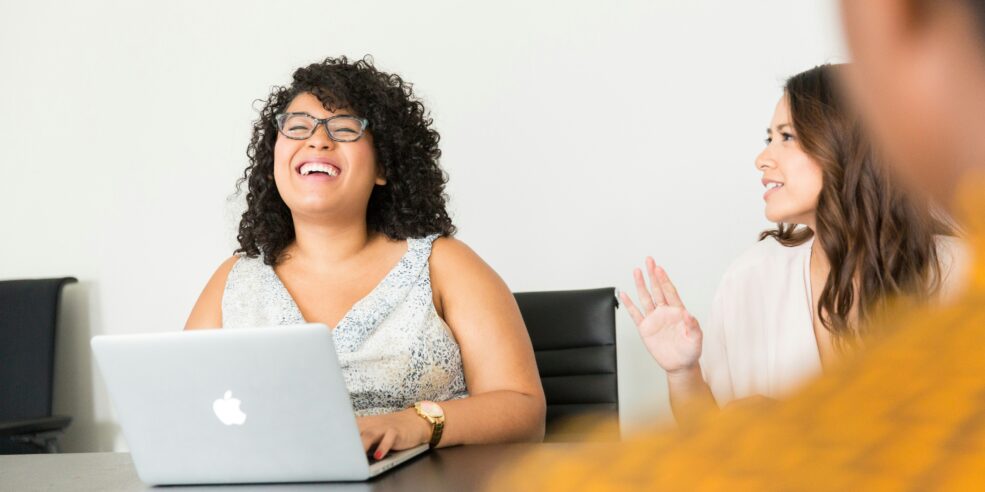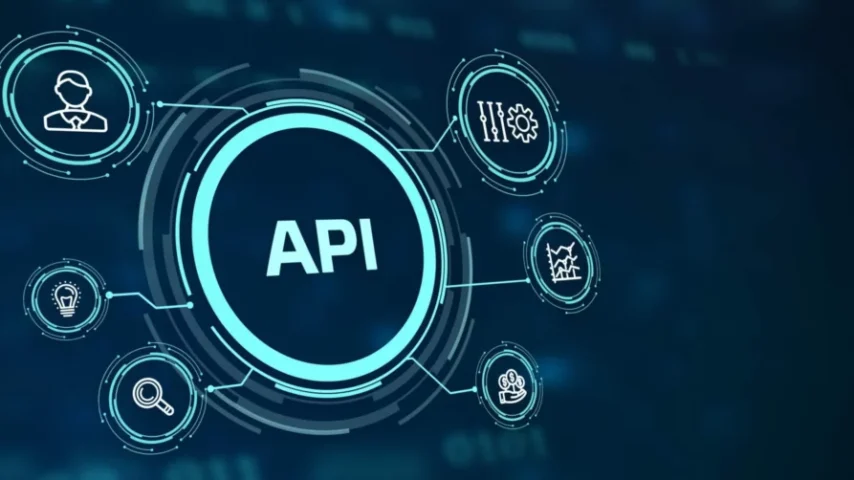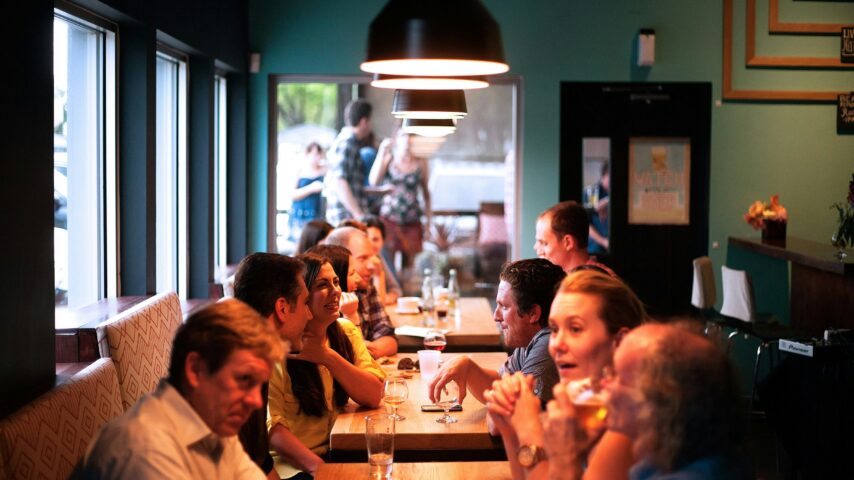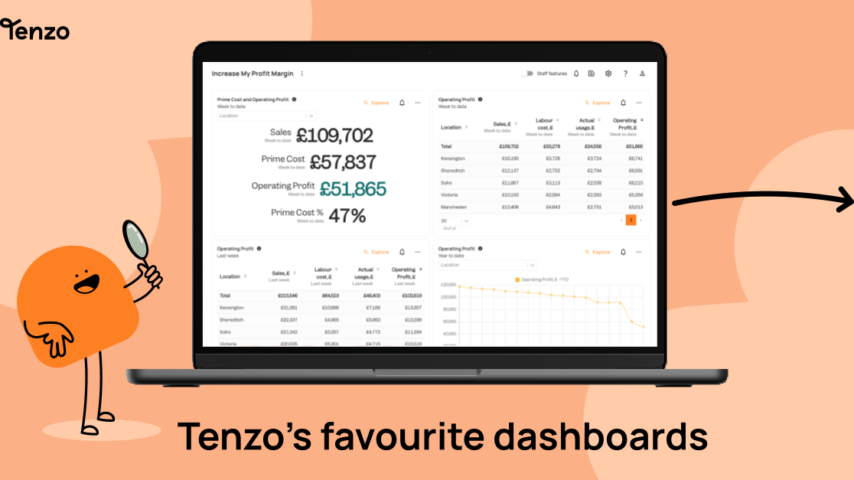In this week’s tech blog, we speak to Amy Nichol and Jessye Tu, who both interned at Tenzo over the summer of 2020, about their experiences at Tenzo, what it’s like to be women in a traditionally-male dominated field and their outlook on their future careers.

Both Amy and Jessye are students at Cambridge, studying Computer Science and Engineering respectively. When we recently caught up over Zoom, I wanted to get a better idea of how they found their passion for these subjects.
Amy: ‘At school, I hadn’t had a lot of exposure to computer science at all, but studied it at GCSE because it seemed cool, it was new, and I liked maths and knew they kind of went hand-in-hand.
I think growing up liking maths more than sciences, you tend to ask yourself ‘what do I want to do? What is a mathematician?’ I then realised that computer science is just applied maths and that exactly suited what I wanted to do. And I sort of discovered it through having it offered to me at GCSE and then at A level. But before that I had no idea that it even existed.’
Elizabeth: How many people in your school did computer science?
Amy: I was at an all girls school, so at GCSE there were 15 of us, which is quite a lot. Then at A Level, our school didn’t even offer it. Two of us wanted to take it, so we had to travel to a different school – which was mixed – and then 4 people from that school took it.
Elizabeth: That’s quite a barrier to entry that you had to travel to a different school!
Amy: The schools were already associated as a consortium, so if there was a smaller class size, only one school taught it instead of having three tiny classes. It was set up to accommodate that, but I thought it was interesting that the girl’s school didn’t offer it – they do now though, which is great.’
As for Jessye, she got into engineering for the real world impact she could have.
I got into coding because I realised you didn’t have to have a massive saw or a drill to make something that would make a real impact on the world – software was actually so important.
Jessye: ‘I wanted to apply to engineering because at the time it seemed like a degree that gave you the technical knowledge and the practical skills to make something which would have a real physical impact on the world.
Even still, I really love the practical aspects of my course. Some people say that engineering is just just baby maths and physics, that it’s not really STEM, not like physics or pure maths (editor’s note: these people are clearly mad). But I really love how it’s got real application to it and that you can literally see it in practice as an air conditioning fan, for example. I know it doesn’t necessarily interest everyone, but it’s nice to see and understand how things work.
I got into coding because I realised you didn’t have to have a massive saw or a drill to make something that would make a real impact on the world – software was actually so important.
I remember the first time I realised that was when I was doing this mini autonomous robot project, and so you had to do the mechanical side – building the robot – and the electrical side – doing all the circuitry – but the robot would not come alive until you put some code on the CPU. And I thought that was really interesting because you’ve got this physical thing, but you know the code is the heart of the machine otherwise it simply wouldn’t work.
And then I realised how rewarding it was getting something to move, getting it to do something exactly how you want it, by just changing one line of code.’
Interestingly, Jessye and Amy had similar experiences at school.
I bet there’s a year 7 girl who would love to do these things, but how is she supposed to get a team together – because most of these are team projects as well – if the school doesn’t promote it? how are they ever going to know? How are they ever going to try?
Jessye: ‘I was originally at an all girls school where there was a Design Technology department and where students were very good at maths and sciences, but it wasn’t until I moved to an all boys school that accepted girls at 6th form, that I saw the crazy difference between the amount of opportunities that the boys had compared to my previous school.
I’d be in assembly and hear that ‘the year 7 team have just competed in such and such robot competition’. And I remember thinking that that sort of thing wasn’t even mentioned at my old school – it was such a stark contrast. And I know people say that boys are just naturally more interested in these things. But no, I bet there’s a year 7 girl who would love to do these things, but how is she supposed to get a team together – because most of these are team projects as well – if the school doesn’t promote it? how are they ever going to know? How are they ever going to try?’
This lack of early exposure is something that Amy brought up as well – her male peers seemed to have been encouraged to code from an early age which led to them gaining a lot more confidence by the time they got to university. When I asked if she sometimes felt like her male peers spoke over her, she was resolute.
Amy: ‘Yeah! Genuinely yes – you can tell it’s not intentional and you start to think that maybe it’s just because of the way I am, maybe I can’t blame it on the fact that I’m female, but then I sort of realised that a lot of them had a lot more exposure and experience to computer science than I had.
Some people speak over everyone, but you do find yourself being talked over. There was one experience where one of my supervisors actually got talked over – I asked a question, and my male supervision partner interrupted my (female) supervisor to answer it. And I didn’t like it. But I think they do tend to be more confident and they do tend to have more experience.’
Jessye, whose engineering cohort is about a 75/25 split men to women, mentioned that this lack of exposure definitely has an impact when it comes to applying to university.
Getting the Tenzo internship was a massive confidence boost because I absolutely loved that internship. And after doing it I started to realise that I could be an engineer and not do a radio society in all my spare time; I could focus on other things like sports, or hanging out with friends and that was a hard journey to go through.
Jessye: ‘When you’re applying to university, they ask for proof that you’re really interested in engineering on your personal statement, and if you’ve done these engineering competitions from year 7 then you’re sorted! Whereas for a girl who’s not had those same opportunities, she has to do more on her own.
For example, the autonomous robot project that I was talking about earlier, I had to do that completely independently. So I definitely think you have to do a lot more independent work which can sometimes be a bit off putting.
Then once I got to university, the hardest thing has been that all the boys already seem to have a massive interest in something – like they say ‘oh, yeah I’m joining the F1 racing team’, or ‘oh, yeah I’m doing radio club or the eco-racing club’. I remember in first year I felt quite intimidated, because I thought that here were all these amazing people who already knew exactly what they were doing. And then on my side, I knew I liked problem-solving, but there wasn’t anything that I could put on a poster that said this is my niche little thing in engineering. I think that’s probably quite common for a lot of girls because the opportunities at school are so different.
I started asking myself if I could really say I was interested in my course when I wasn’t as crazy passionate as those people? But I don’t think that’s really a fair comparison to make – I realised that over the course of first year after I signed up to a radio society and an eco-racing society in an attempt to prove that I really was an engineer.
While the societies were really cool, I still don’t know if it was really my thing because it was all a bit stressful at times. I kept thinking, ‘no this is what an engineer should be doing and this is what I should be good at in order to be here’, but actually getting the Tenzo internship was a massive confidence boost because I absolutely loved that internship. And after doing it I started to realise that I could be an engineer and not do a radio society in all my spare time; I could focus on other things like sports, or hanging out with friends and that was a hard journey to go through.’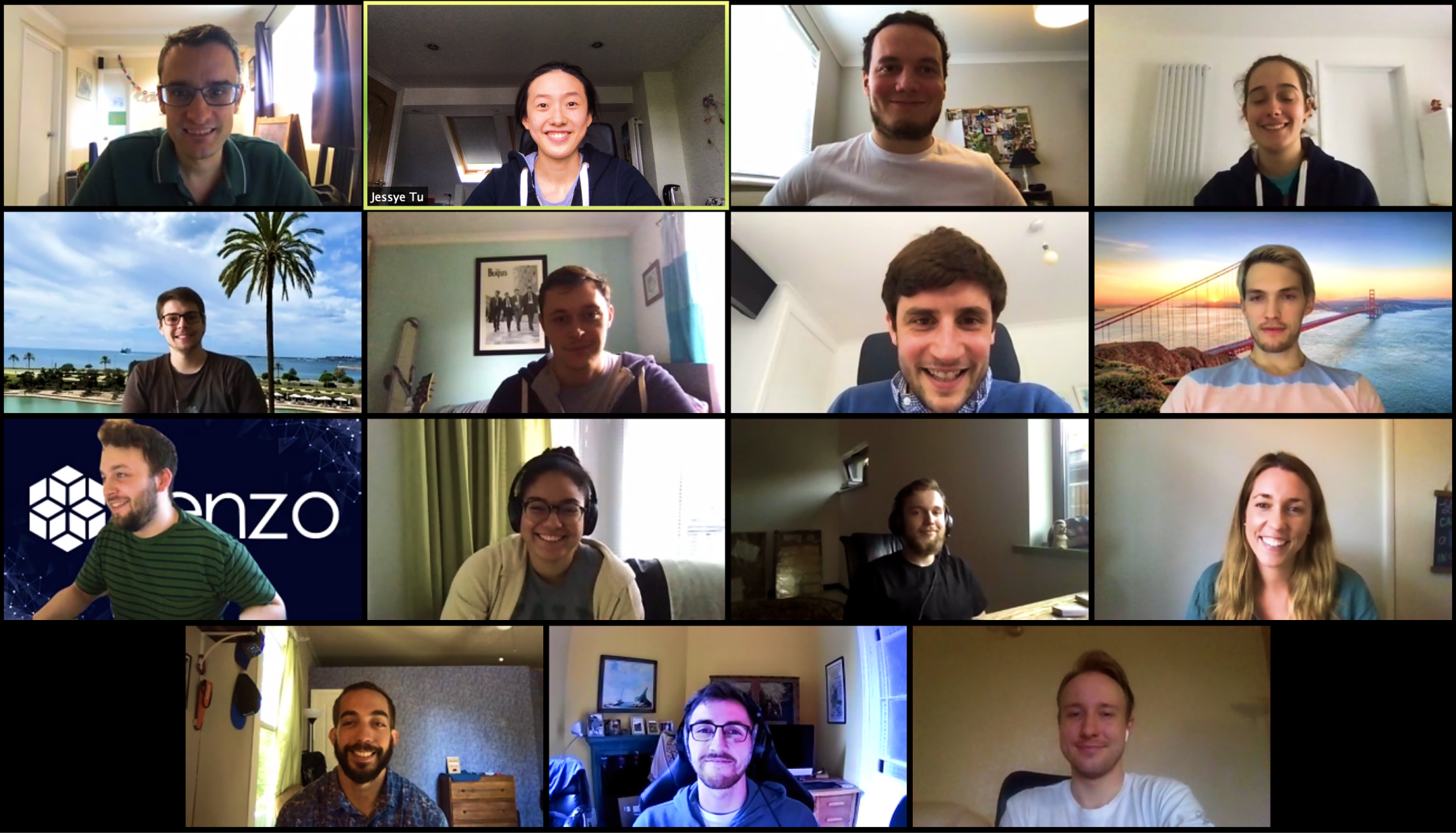
After hearing about both their journeys to get into their respective fields, I was really interested to find out how both these amazing students came to choose Tenzo as their summer internship.
I knew I’d be working as part of the team, I’d have ownership over what I did, but it would be integrated with other people on the team, I wouldn’t be by myself. And that sounded really good to me, a really cool learning experience – something that I could take with me.
Amy: ‘I actually didn’t know anything about Tenzo until I had a career day and Tenzo was there. I looked up the list of companies who would be there beforehand and I just went through the names and saw Tenzo, looked you guys up, saw what you did, and thought it was cool.
The size of the company was appealing to me because I liked the idea of being part of a team and I thought going into a smaller company as a less experienced person would be easier for me in some way. Also, you use Python which is nice. (laughs)
So then I went to the careers fair and spoke to you guys there and because I had looked Tenzo up beforehand I was able to get quite a lot out of that conversation. I knew I’d be working as part of the team, I’d have ownership over what I did, but it would be integrated with other people on the team, I wouldn’t be by myself. And that sounded really good to me, a really cool learning experience – something that I could take with me.
Jessye knew she needed to get an internship to pass the practical element of her course:
Jessye: ‘I remember applying to loads of places, but what I found really cool about Tenzo was you could see the goal you were going for and what you were trying to achieve. I thought it was so inspiring to see something making a real impact. Also just the story of Tenzo, I still think Christian and Adam are the coolest for actually trying to fix a real world problem that is obviously close to their heart.’
As interns in the dev team, I wanted to know more about their experience and what they learnt along the way.
Amy: ‘When I joined, it was really nice – I met everyone pretty much right away because of the morning standups, it was a really great way to quickly immerse myself. The first thing I remember doing was working on the APIs and I thought that was the coolest thing because I had no experience doing anything like that and it was really nice just to get thrown straight in and given my own task but also having contact points where I could easily ask for help, so it didn’t feel like an individual project. It was an important project that was actually used by the other devs and that happened straight away.
He said once, ‘it’s better to solve a problem together in five minutes, than solve it alone in three hours.’ And that really stuck with me because it was so true.
Jessye: ‘I remember starting was quite crazy, because obviously when the pandemic hit I wasn’t quite sure if the internship would still be on as I knew what was happening in restaurants and knew you worked so closely with them. So I remember being so happy when it was on.
And I remember just learning, everything was learning. I think it’s because I had no experience before so almost every line of code there would be something that I’d have to ask how to do so a big part of it was actually learning how to ask questions and how to ask for help. Because the thing is a lot of the time, you think, no I’ll just google this, and then click on 5 links, open 5 tabs but still not really know the answer. Then you maybe change the google search a bit, find five other links and open them. And you think, ‘shall I just keep going?’
But I remember Victor was so helpful; he said once, ‘it’s better to solve a problem together in five minutes, than solve it alone in three hours.’ And that really stuck with me because it was so true. He would just be on the Zoom call with me and say, ‘let’s just wait a bit longer to see if it actually goes through, and that it works.’ And I’m so glad he did because sometimes there would be another error straight after.
Doing the internship remotely was kind of weird in that sense, because I think if I was in an office it would be easier to say ‘oh it’s gone wrong again’. But at the same time with Slack and everything it was really easy to ask people for help which was just great, especially because I didn’t have a computer science background and I was learning a lot more computer science stuff. I even remember Amy saying, ‘Oh yeah, I’ve heard of that before in a textbook.’ And I was like, ‘woah, I have not’ (laughs).
But at the same time it was nice to see that even though I didn’t have the same background, I could still pick it up and, at the end of the day, my code was still good and worked properly.
When asked about the most exciting part of their internship, they both mentioned being able to take ownership of a project.
Amy: ‘The most exciting thing I did over the internship was the integration with RotaReady. I actually went and presented it to the people that worked there. It felt really cool to be able to say, yes, I’ve done this, ask me questions about it – I probably know the answer. Just to become the person that knows what’s going on in a certain piece of software and take ownership of that was definitely the best bit.
I remember just being so happy about how it was perceived at the company, everyone was so supportive and it’s something that I’m really really proud of now.
Jessye: ‘The Shopify integration was exciting because that was properly from scratch. I remember while doing it, it felt like I was carving something new by myself. And it was also I think it was through writing that extractor that I realised that we had to change ‘create relations’ because it was just taking too long. So it was really fun to rewrite that as well.
And I remember just being so happy about how it was perceived at the company, everyone was so supportive and it’s something that I’m really really proud of now. And it’s quite weird because it was a pretty small change I guess but it was nice to see that it would actually make a difference to everyone. Even the new intern this summer, he sent me a message on facebook saying, ‘hello, I’m watching your create relations video by the way’ so that was quite funny (laughs).
When asked about her remote experience Jessye was complimentary.
‘I thought it was pretty good especially because we always had the morning stand ups and then quite a few other meetings throughout the week for the sprint. I think that was quite good because it brought everyone together onto the same screen and you could see everyone.’
And Amy also got that same feeling: ‘I think the difference between a small company and a big company is that at a big company you’re split into smaller teams whereas at Tenzo it was all one big team, I feel like I got to know more people. That’s what I loved about Tenzo, knowing everyone and seeing everyone really regularly – it was more social.
I can tell it would be even better in person. I mean if it felt like so much of a community while I was at home, imagine what it would be like if I actually met someone. (laughs) (editor’s note: Amy will meet us! We’ve promised both Jessye and Amy drinks and an actual face-to-face activity!)
After completing the internship, it was great to hear that both Amy and Jessye would like to step into Software Engineering roles after they graduate, (well maybe not immediately in Amy’s case).
Amy: After I graduate I really want to go on holiday (laughs). On a serious note, I’m probably going to go into software engineering in some capacity.
Jessye: I think it would be really nice to be a software engineer. If I can call myself a software engineer I’d be really happy.
A huge thanks goes to both Amy and Jessye for talking to us about their experience both in the world of computer science at large and also about Tenzo. They made such an impact on the team during their time here and we were all very sad when they had to return to their studies. We wish them all the success and hope to work together again in the future!
